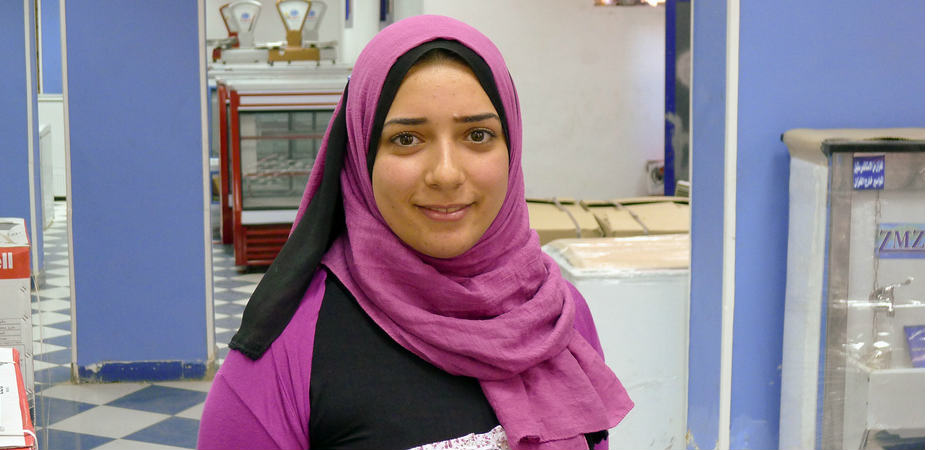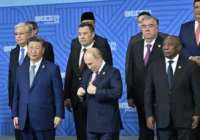Putin is an old school Russian tsar in a modern avatar, fighting to retain great power status for his country.
July 2014 will be remembered as a historic month. While the world is fixated on the conflict in Gaza, a major global development has gone unnoticed. Brazil, Russia, India, China and South Africa, collectively known as BRICS, got together to create a development bank that will start out with $100 billion in capital and will be based in Shanghai. Finally, BRICS have thrown the gauntlet to the International Monetary Fund (IMF), the World Bank and the G7 nations that have long marginalized the majority world in the global decision making process.
Brazilian President Dilma Rousseff declared that BRICS wanted “justice and equal rights,” and called on the IMF to revise its distribution of voting rights to reflect the growing importance of emerging economies. So far, Europe has fanatically guarded its imperial privileges in international institutions. As Atul Singh, Fair Observer’s founder and editor-in-chief, pointed out in the 2013 IMF annual meetings, Southeast Asia was prescribed austerity while southern Europe was given bailouts when faced with the same crisis, in part, because the IMF is a European club.
Earlier, the domination of the US and Europe was justified on the grounds that these were creditor countries. Today, apart for guilt-ridden Germany, the rest of the powerful nations are debtors owing money to emerging economies such as China. Yet they control nearly 40% of the voting power, while China and India are restricted to the 2-3% range. This is simply apartheid. BRICS clearly decided the time had come for this to stop. The BRICS bank may well fail, but emerging economies are beginning to demonstrate that they are willing to create their own club if they are not treated with respect. The time for old white boys making decisions for the planet while smoking fine cigars is fast running out.
Speaking of old white boys, the BBC, The Economist and the horrendous American media have been covering the Gaza conflict with a healthy disregard to facts. Hamas is certainly not an organization that endears itself to people who prefer non-violence and favor women’s rights. Like the American religious right with its excessive fixation on the Bible, Hamas cares a touch too much about God and too little about critical intellectual inquiry. Yet the BBC headline, “Israel under renewed Hamas attack,” was disgraceful even by the standards of an organization created to uphold the British Empire. Right under the Gaza story was the beaming photo of cherubic baby George, or “Prince George,” the future monarch of the pre-modern, class-divided, Etonian-ruled United Kingdom of Great Britain and Northern Ireland. The truth of the matter is that the rockets Hamas fires are pinpricks that cause little damage to Israel. All they do is provide the Israelis with an excuse to use disproportionate force, with little regard to even the lives of children.
In mainstream media, few reports point out that Gaza is an overpopulated prison, where displaced Palestinians live in terrible conditions under an Israeli embargo with no prospects … The reality is that Palestinians have suffered tragic casualties and catastrophic destruction. Even a UN school in Gaza has not been spared.
Since Hamas has alienated most regimes in the region, it has few friends left. Israel calculates that this is the time to crush Hamas. Hamas has been foolish enough to give Israelis an excuse to roll in its tanks. Such is the venom on the Israeli side that key figures want to “destroy Hamas.” An extreme figure has even suggested that Israelis rape female relatives of Hamas members to break the spirit of the organization. The fact of the matter is that Israel has launched an invasion. It has been behaving recklessly under Prime Minister Binyamin Netanyahu by building illegal settlements in the West Bank and East Jerusalem, opposing any deal with Iran and playing a dubious role in Syria. The purported terrorism of Hamas is war of the weak, while Israel’s war on Gaza is terrorism of the strong.
In mainstream media, few reports point out that Gaza is an overpopulated prison, where displaced Palestinians live in terrible conditions under an Israeli embargo with no prospects. Norman Finkelstein, a prominent American Jewish intellectual, rightly points out how the narrative by dominant Western interlocutors, including the venerable Human Rights Watch, has whitewashed Israeli actions. The reality is that Palestinians have suffered tragic casualties and catastrophic destruction. Even a UN school in Gaza has not been spared.
US President Barack Obama has publicly backed Israel, but is wringing his hands in private as Tel Aviv’s actions harm American interests by lowering its political capital in the Middle East. With a stiff and woody secretary of state proving to be increasingly ineffectual, US policy for the region has been in a state of drift. It has no fresh ideas as to how to deal with Syria, Iraq, Libya and, of course, Palestine.
Finally, no account of this month would be complete without referring to the tragedy that befell Malaysia Airlines Flight MH17 in Ukraine. Anna Pivovarchuk, Fair Observer’s deputy managing editor, has been scathing in her criticism of Russian President Vladimir Putin, whom she holds responsible for the tragedy. She argues that Putin does not value human life and points out his terrible track record that has caused much human suffering. For Putin, retaining influence in the Russian-inhabited parts of Ukraine is supremely important, as the country has chosen to embrace the US and jettison Russia. As a former KGB colonel, Putin bemoans the unraveling of the Soviet Union and the loss of Russia’s great power status. He is an old school Russian tsar in a modern avatar, fighting to retain great power status for his country. Collateral casualties are acceptable in the process, just as Palestinian deaths are inconvenient but inevitable for Israel’s allies such as the US and Britain.
Please find below our best articles for the month and we welcome you to share your thoughts.
[seperator style=”style1″]1: America: Lost Child of the Enlightenment[/seperator]
Ideas of the Enlightenment that led to the creation of America have been set aside for celebrities, cheerleaders and consumerism.
Every year, I write something for the Fourth of July, the day the United States of America celebrates its independence. Last year, my article that delved into inequality, education and liberty upset the mother of a friend because birthdays and anniversaries are not moments when you say anything critical. Read More
[seperator style=”style1″]2: Gaza: No Innocent Victims?[/seperator]
A destructive mindset among Israelis justifies violence against Palestinians.
In 1894, a young anarchist left a bomb outside the offices of a mining company in Paris. Before he met the guillotine, Emile Henri claimed that his very humanity compelled him to act the way he did, in defense of the starving and exploited men working in the mines. But what about the innocent victims of the bombing? “I soon resolved that question,” explained Henri. Read More
[seperator style=”style1″]3: The Tech Revolution: Female Entrepreneurship and Youth Employment[/seperator]
Promoting female entrepreneurship in developing countries is crucial in the fight against poverty.
After a discussion with Christopher M. Schroeder, it was clear that female entrepreneurship is thriving across the Middle East and North Africa, particularly in the technology sector. In his new book, Startup Rising: The Entrepreneurial Revolution Remaking the Middle East, Schroeder reports that over a third of startups in the region are run by women. Read More
[seperator style=”style1″]4: Kenya: From Prison Inmates to Ambassadors of Change[/seperator]
Nafisika Trust aims to help young people in Kenyan prisons to become ambassadors of change, not of crime.
Vickie Wambura Wamonje founded Nafisika Trust after discovering that Kenyan prisoners were often young repeat offenders who continued to commit crimes following their release from prison. She wanted to provide transformational experiences to help inmates become agents of positive change rather than perpetrators of crime in their communities. Read More
[seperator]5: Banning Children’s Literature: The Right to Read[/seperator]
Literature helps young people realize they are not alone in the world.
The National Children’s Book and Literary Alliance (NCBLA), founded by young people’s authors and illustrators, believes that literacy is far more than the ability to read. Its primary function is as an advocacy and education organization promoting literacy, libraries and literature. Censorship and reading rights issues are an auxiliary interest rather than a primary focus. Read More
The views expressed in this article are the author’s own and do not necessarily reflect Fair Observer’s editorial policy.
Degtyaryov Andrey / Gary Yim / Chameleons Eye / Jannoon28 / Shutterstock.com
Support Fair Observer
We rely on your support for our independence, diversity and quality.
For more than 10 years, Fair Observer has been free, fair and independent. No billionaire owns us, no advertisers control us. We are a reader-supported nonprofit. Unlike many other publications, we keep our content free for readers regardless of where they live or whether they can afford to pay. We have no paywalls and no ads.
In the post-truth era of fake news, echo chambers and filter bubbles, we publish a plurality of perspectives from around the world. Anyone can publish with us, but everyone goes through a rigorous editorial process. So, you get fact-checked, well-reasoned content instead of noise.
We publish 2,500+ voices from 90+ countries. We also conduct education and training programs
on subjects ranging from digital media and journalism to writing and critical thinking. This
doesn’t come cheap. Servers, editors, trainers and web developers cost
money.
Please consider supporting us on a regular basis as a recurring donor or a
sustaining member.
Will you support FO’s journalism?
We rely on your support for our independence, diversity and quality.












Comment
Very interesting article giving unbiased reporting of this event. The emergence of BRICS countries is set to change the rules of Multilateral Governance. Although, it will take some time. For now all these countries have been preoccupied with their internal conflicts but now they are also responding to global events that have been reshaped by a few elite countries. A beginning has been made by announcing the establishment of New Development Bank that gives equal voting rights to each member countries . I am sure it will redefine the funding for development projects and expedite the development process for low developed countries.I must compliment Fair Observer and Atul Singh for bringing out this insightful column.
Regards
Samar Tyagi
BHU Varanasi (India)